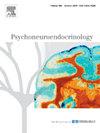硫化氢通过调节自噬改善cums诱导小鼠的抑郁样行为
IF 3.4
2区 医学
Q2 ENDOCRINOLOGY & METABOLISM
引用次数: 0
摘要
抑郁症的发病机制与自噬过程中的突触损伤和功能障碍有关。孟德尔随机化(MR)分析显示,6个GWAS id显示Beclin-1水平与抑郁风险之间存在显著关联。此外,所有snp对抑郁风险均有正向影响。使用单细胞RNA测序(scRNA-seq)分析抑郁症患者的神经元,发现AKT、mTOR和与突触可塑性相关的基因表达减少。PI3K/AKT/mTOR信号的激活已被证明可以控制自噬并对神经系统具有保护作用。硫化氢(H2S)是一种内源性气体递质,可以通过改善神经元突触可塑性来治疗各种神经系统疾病。然而,H2S是否通过PI3K/AKT/mTOR信号调节自噬,改善神经元突触可塑性损伤,并起到抗抑郁作用尚不清楚。我们目前的研究表明,在慢性不可预测轻度应激(CUMS)诱导的抑郁症小鼠中,p-PI3K、p-AKT和p-mTOR蛋白表达的减少增加了神经元自噬活性,降低了突触可塑性。外源性硫化氢供体NaHS治疗1天,连续治疗1周,小鼠抑郁样行为得到改善。与NaHS治疗1天后比较,上述蛋白表达水平恢复并维持,且持续治疗1周后抗抑郁效果更为显著。此外,研究人员利用PI3K抑制剂LY294002证明了NaHS通过激活PI3K/AKT/mTOR信号通路抑制自噬,改善突触可塑性损伤。这项研究为H2S的抗抑郁机制提供了新的见解,突出了其抗抑郁治疗潜力。本文章由计算机程序翻译,如有差异,请以英文原文为准。
Hydrogen sulfide improves depression-like behaviors in CUMS-induced mice by regulating autophagy
The pathogenesis of depression is associated with synaptic impairment and dysfunction in autophagy processes. Mendelian randomization (MR) analysis revealed that six GWAS IDs revealed a significant association between Beclin-1 levels and depression risk. Besides, all SNPs had a positive effect on depression risk. Analyzing neurons from depressed individuals using single-cell RNA sequencing (scRNA-seq) uncovered decreased expression of AKT, mTOR, and genes linked to synaptic plasticity. The activation of the PI3K/AKT/mTOR signaling has been demonstrated to control autophagy and have a protective effect on the nervous system. Hydrogen sulfide (H2S) is an endogenous gasotransmitter that can potentially treat various neurological disorders by improving neuronal synaptic plasticity. However, whether H2S regulates autophagy through PI3K/AKT/mTOR signaling, improves neuronal synaptic plasticity damage, and plays an antidepressant role is unclear. Our current research revealed that the reduction in the expression of p-PI3K, p-AKT, and p-mTOR proteins increase in neuronal autophagy activity and decline synaptic plasticity in mice with depression induced by chronic unpredictable mild stress (CUMS). Treatment with the exogenous hydrogen sulfide donor NaHS for one day and continuous treatment for one week improved the depression-like behaviors in the mice. Compared with those after one day of NaHS treatment, the above protein expression levels were restored and maintained, and the antidepressant effect was more significant after one week of continuous treatment with NaHS. Moreover, the PI3K inhibitor LY294002 was used to demonstrate that NaHS suppresses autophagy through activating the PI3K/AKT/mTOR signaling and ameliorates synaptic plasticity impairments. This study provides novel insights into the antidepressant mechanisms of H2S, highlighting its antidepressant therapeutic potential.
求助全文
通过发布文献求助,成功后即可免费获取论文全文。
去求助
来源期刊

Psychoneuroendocrinology
医学-精神病学
CiteScore
7.40
自引率
8.10%
发文量
268
审稿时长
66 days
期刊介绍:
Psychoneuroendocrinology publishes papers dealing with the interrelated disciplines of psychology, neurobiology, endocrinology, immunology, neurology, and psychiatry, with an emphasis on multidisciplinary studies aiming at integrating these disciplines in terms of either basic research or clinical implications. One of the main goals is to understand how a variety of psychobiological factors interact in the expression of the stress response as it relates to the development and/or maintenance of neuropsychiatric illnesses.
 求助内容:
求助内容: 应助结果提醒方式:
应助结果提醒方式:


